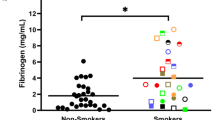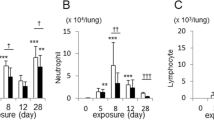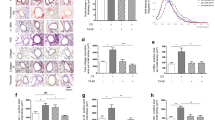Abstract
Summary: Balb/c mice were exposed to smoke from Kentucky Reference IRI cigarettes within 24 hr after birth on a Prototype Mark II Walton Horizontal Smoke Exposure Machine for various periods of time up to 10 wk of age. There was no difference in the magnitude of the splenic plaque-forming cells (PFC) response in smoke-exposed and untreated control animals immunized with sheep red blood cells (SRBC) on sequential days up to day 9 postpartum. However, beginning at day 10 and for each subsequent time period assayed thereafter, there was a statistically significant reduction in the number of splenic PFC observed in the smoke-exposed animals. On day 10, the PFC response of smoke-exposed mice was reduced by 33%, on day 14, there was a 60% reduction, whereas animals exposed to smoke from 4–10 wk showed a 90% reduction of the splenic PFC response.
Speculation: The finding that exposure of newborn mice to cigarette smoke resulted in a marked inhibition of the maturation of the splenic antibody response to SRBC is consistent with previous reports of the immunosuppressive effects of cigarette smoke exposure in experimental animals and humans. It is possible that this inhibitory effect is manifest at the level of the macrophage or the thymus-derived lymphocyte, both of which have been suggested to be functionally immature in the newborn mouse.
Similar content being viewed by others
Log in or create a free account to read this content
Gain free access to this article, as well as selected content from this journal and more on nature.com
or
Author information
Authors and Affiliations
Rights and permissions
About this article
Cite this article
Herscowitz, H., Cooper, R. Effect of Cigarette Smoke Exposure on Maturation of the Antibody Response in Spleens of Newborn Mice. Pediatr Res 13, 987–991 (1979). https://doi.org/10.1203/00006450-197909000-00007
Issue date:
DOI: https://doi.org/10.1203/00006450-197909000-00007



